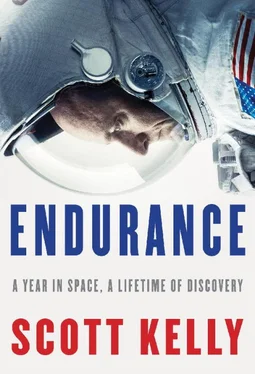—
WHEN I WAS a boy, I had a strange recurring daydream. I saw myself confined to a small space, barely big enough to lie down in. Curled up on the floor, I knew that I would be there for a long time. I couldn’t leave, but I didn’t mind—I had the feeling I had everything I needed. Something about that small space, the sense that I was doing something challenging just by living there, was appealing to me. I felt I was where I belonged.
One night when I was five, my parents shook Mark and me awake and hustled us down to the living room to watch a blurry gray image on TV, which they explained was men walking on the moon. I remember hearing the staticky voice of Neil Armstrong and trying to make sense of the outrageous claim that he was visiting the glowing disc in the New Jersey summer sky I could see out our window. Watching the moon landing left me with a strange recurring nightmare: I dreamed I was preparing to launch on a rocket to the moon, but rather than being secured safely in a seat inside, I was instead strapped across the pointy end of the rocket, my back against its nose cone, facing straight up at the heavens. The moon loomed over me, its giant craters threatening, as I waited through the countdown. I knew I couldn’t possibly survive the moment of ignition. Every time I had this dream, I woke up, sweating and terrified, just before the engines burned their fire into the sky.
As a kid, I took all the risks I could, not because I was foolhardy but because everything else was boring. I threw myself off things, crawled under things, took dares from other boys, skated and slid and swam and capsized, sometimes tempting death. Mark and I climbed up drainpipes starting when we were six, waving back down at our parents from roofs two or three stories up. Attempting something difficult was the only way to live. If you were doing something safe, something you already knew could be done, you were wasting time. I found it bewildering that some people my age could just sit still, breathing and blinking, for entire school days—that they could resist the urge to run outside, to take off exploring, to do something new, to take risks. What went through their heads? What could they learn in a classroom that could even approach the feeling of flying down a hill out of control on a bike?
I was a terrible student, always staring out windows or looking at the clock, waiting for class to be over. My teachers scolded, then chastised, then finally—some of them—ignored me. My parents, a cop and a secretary, tried unsuccessfully to discipline my brother and me. Neither of us listened. We were on our own much of the time—after school, while our parents were still at work, and on weekend mornings, when our parents were sleeping off a hangover. We were free to do what we liked, and what we liked was to take risks.
During my high school years, for the first time I found something I was good at that adults approved of: I worked as an emergency medical technician. When I took the EMT classes, I discovered that I had the patience to sit down and study. I started as a volunteer and in a few years worked my way up to a full-time job. I rode in an ambulance all night, never knowing what I would face next—gunshot wounds, heart attacks, broken bones. Once I delivered a baby in a public housing project, the mother in a rancid bed with old unwashed sheets, a single naked lightbulb swinging overhead, dirty dishes piled in the sink. The heart-pounding feeling of walking into a potentially dangerous situation and having to depend on my wits was intoxicating. I was dealing with life-and-death situations, not boring—and, to me, pointless—classroom subjects. In the morning, I often drove home and went to sleep instead of going to school.
I managed to graduate from high school, in the bottom half of my class. I went to the only college I was accepted to (which was a different college than the one I had meant to apply to—such were my powers of concentration). There, I had no more interest in schoolwork than I’d had in high school, and I was also getting too old to jump off things for fun. Partying took the place of physical risk, but it wasn’t as satisfying. When asked by adults, I said I wanted to be a doctor. I’d signed up for premed classes but was failing them in my first semester. I knew I was just marking time until I’d be told I would have to do something else, and I had no idea what that would be.
One day I walked into the campus bookstore to buy snacks, and a display caught my eye. The letters on the book’s cover seemed to streak into the future with unstoppable speed: The Right Stuff. I wasn’t much of a reader—whenever I was assigned to read a book for school, I would barely flip through it, hopelessly bored. Sometimes I’d look at the CliffsNotes and remember enough of what I read to pass a test on the book, sometimes not. I had not read many books by choice in my entire life—but this book somehow drew me to it.
I picked up a copy, and its first sentences dropped me into the stench of a smoky field at the naval air station in Jacksonville, Florida, where a young test pilot had just been killed and burned beyond recognition. He had crashed his airplane into a tree, which “knocked [his] head to pieces like a melon.” The scene captured my attention like nothing else I had ever read. Something about this was deeply familiar, though I couldn’t say what.
I bought the book and lay on my unmade dorm room bed reading it for the rest of the day, heart pounding, Tom Wolfe’s hyperactive, looping sentences ringing in my head. I was captivated by the description of the Navy test pilots, young hotshots catapulting off aircraft carriers, testing unstable airplanes, drinking hard, and generally moving through the world like exceptional badasses.
The idea here (in the all-enclosing fraternity) seemed to be that a man should have the ability to go up in a hurtling piece of machinery and put his hide on the line and then have the moxie, the reflexes, the experience, the coolness, to pull it back in the last yawning moment—and then to go up again the next day, and the next day, and every next day, even if the series should prove infinite—and, ultimately, in its best expression, do so in a cause that means something to thousands, to a people, a nation, to humanity, to God.
This wasn’t just an exciting adventure story. This was something more like a life plan. These young men, flying jets in the Navy, did a real job that existed in the real world. Some of them became astronauts, and that was a real job too. These were hard jobs to get, I understood, but some people did get them. It could be done. What drew me to these Navy pilots wasn’t the idea of the “right stuff”—a special quality these few brave men had—it was the idea of doing something immensely difficult, risking your life for it, and surviving. It was like a night run in the ambulance, but at the speed of sound. The adults around me who encouraged me to become a doctor thought I liked being an EMT because I liked taking people’s blood pressure measurements, stabilizing broken bones, and helping people. But what I craved about the ambulance was the excitement, the difficulty, the unknown, the risk. Here, in a book, I found something I’d thought I would never find: an ambition. I closed the book late that night a different person.
I would be asked many times over the following decades what the beginning of my career as an astronaut was, and I would talk about seeing the moon landing as a kid, or seeing the first shuttle launch. These answers were to some extent true. I never told the story about an eighteen-year-old boy in a tiny, stuffy dorm room, enthralled by swirling sentences describing long-dead pilots. That was the real beginning.
—
WHEN I BECAME an astronaut and started getting to know my astronaut classmates, many of us shared the same memory of coming downstairs in our pajamas as little kids to watch the moon landing. Most of them had decided, then and there, to go to space one day. At the time, we were promised that Americans would land on the surface of Mars by 1975, when I was eleven. Everything was possible now that we had put a man on the moon. Then NASA lost most of its funding, and our dreams of space were downgraded over the decades. Yet my astronaut class was told we would be the first to go to Mars, and we believed it so fully that we put it on the class patch we wore on our flight jackets, a little red planet rising above the moon and the Earth. Since then, NASA has accomplished the assembly of the International Space Station, the hardest thing human beings have ever achieved. Getting to Mars and back will be even harder, and I have spent a year in space—longer than it would take to get to Mars—to help answer some of the questions about how we can survive that journey.
Читать дальше












